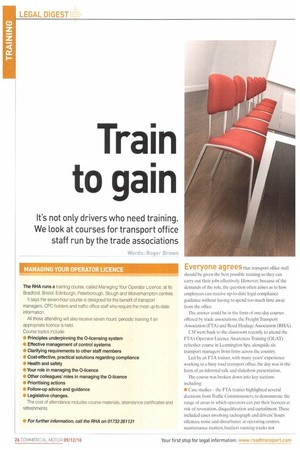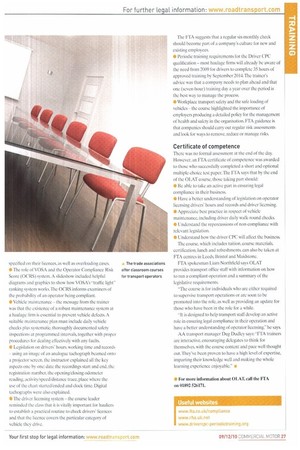Train to gain
Page 26

Page 27

If you've noticed an error in this article please click here to report it so we can fix it.
It's not only drivers who need training. We look at courses for transport office staff run by the trade associations
WOFCIS: Roger Brown Everyone agrees that transport office staff should be given the best possible training so they can carry out their jobs effectively. However, because of the demands of the role, the question often arises as to how employees can receive up-to-date legal compliance guidance without having to spend too much time away from the office.
The answer could be in the form of one-day courses offered by trade associations, the Freight Transport Association (FTA) and Road Haulage Association (RHA).
CM went back to the classroom recently to attend the FTA's Operator Licence Awareness Training (OLAT) refresher course in Leamington Spa, alongside six transport managers from firms across the country.
Led by an FTA trainer, with many years' experience working in a busy road transport office, the day was in the form of an informal talk and slideshow presentation.
The course was broken down into key sections including:
• Case studies — the FTA trainer highlighted several decisions from Traffic Commissioners, to demonstrate the range of areas in which operators can put their licences at risk of revocation, disqualification and curtailment. These included cases involving tachograph and drivers' hours offences, noise and disturbance at operating centres, maintenance matters, hauliers running trucks not
specified on their licences, as well as overloading cases.
• The role of VOSA and the Operator Compliance Risk Score (OCRS) system. A slideshow included helpful diagrams and graphics to show how VOSA's "traffic lightran king system works. The OCRS informs examiners of the probability of an operator being compliant. O Vehicle maintenance the message from the trainer was that the existence of a robust maintenance system at a haulage firrn is essential to prevent vehicle defects. A suitable maintenance plan must include daily vehicle checks plus systematic, thoroughly documented safety inspections at programmed intervals, together with proper procedures for dealing effectively with any faults.
• Legislation on drivers' hours, working time and records using an image of an analogue tachograph beamed onto a projector screen, the instructor explained all the key aspects one by one: date the recordings start and end, the registration number, the opening/closing odometer reading. activity/speed/distance trace, place where the use of the chart started/ended and clock time. Digital tachographs were also explained.
* The driver licensing system the course leader reminded the class that it is vitally important for hauliers to establish a practical routine to check drivers licences and that the licence covers the particular category of vehicle they drive. The FTA suggests that a regular six-monthly check should become part of a company's culture for new and existing employees.
Periodic training requirements for the Driver CPC qualification most haulage firms will already be aware of the need from 2009 for drivers to complete 35 hours of approved training by September 2014. The trainer's advice was that a company needs to plan ahead and that one (seven-hour) training day a year over the period is the best way to manage the process.
• Workplace transport safety and the safe loading of vehicles the course highlighted the importance of employers producing a detailed policy for the management of health and safety in the organisation. ETA guidance is that companies should carry out regular risk assessments and look for ways to remove, reduce or manage risks.
Certificate of competence There was no formal assessment at the end of the day. However. an FTA certificate of competence was awarded to those who successfully completed a short and optional multiple-choice test paper. The VIA says that by the end of the OLAT course, those taking part should: • Be able to take an active part in ensuring legal compliance in their business.
• Have a better understanding of legislation on operator licensing drivers' hours and records and driver licensing, • Appreciate best practice in respect of vehicle maintenance, including driver daily walk-round checks.
• Understand the repercussions of non-compliance with relevant legislation.
• Understand how the driver CPC will affect the business.
The course, which includes tuition, course materials, certification, lunch and refreshments, can also he taken at ETA centres in Leeds. Bristol and Maidstone.
ETA spokesman Liam Northfield says OLAT provides transport office staff with information on how to run a compliant operation and a summary of the legislative requirements.
"The course is for individuals who are either required to supervise transport operations or are soon to be promoted into the role, as well as providing an update for those who have been in the role for a while,
It is designed to help transport staff develop an active role in ensuring legal compliance in their operation and have a better understanding of operator licensing," he says.
AA transport manager Dug Dudley says: "FTA trainers are interactive, encouraging delegates to think for themselves, with the course content and pace well thought out.They've been proven to have a high level of expertise, imparting their knowledge well and making the whole learning experience enjoyable.in
























































































































